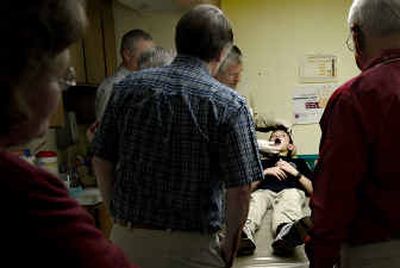Local clinic, dentists try to ease area’s pain

The patients who arrive at the Dirne Community Health Clinic moaning and clutching their jaws in pain frustrate Dr. Leanne Rousseau.
“We probably see 10 to 12 people a month with screaming dental pain,” says Rousseau, medical director at the clinic, which treats the area’s uninsured. “And that doesn’t count the low-level problems. It’s appalling.”
As a nurse in Kootenai Medical Center’s emergency room, Beth Clemens sees at least a handful of people with traumatic tooth pain every day she works.
“Dental health in this community is abysmal,” Clemens says.
It’s aggravating to both women that they can do little to help poor and uninsured people with tooth pain. Neither facility offers dental care, so both refer patients to the Community Health Association of Spokane (CHAS) or to Benewah Medical and Wellness Center in Plummer, Idaho.
But the Dirne Clinic is working to change that situation. It has the equipment to open two dental examination rooms when it has the room and proper wiring. Until then, clinic trustee Tom Smart, a Coeur d’Alene dentist, has found a dozen or more dentists willing to accept patients with vouchers from the clinic for low-cost dental treatment.
Patients with clinic vouchers will pay $25 to visit a dentist in the program. The clinic also will pay $25 per patient to help cover dentists’ costs for supplies and staffing. Dentists will donate other costs.
Joel Hughes, Dirne’s executive director, says he expects most vouchers to go to patients with dental emergencies.
“Dentists are expensive, and there’s a national shortage,” Hughes says. “Preferably, we’ll do things they can handle in a single visit. We’re trying to start that in the next 30 days.”
The Idaho Panhandle has too few dentists for families living within 200 percent of the poverty rate, according to the state’s Office of Rural Health. Ninety-two general dentists and 17 specialists work in North Idaho, with most of them in Kootenai County. That’s also where the greatest concentration – 34,505 – of people with low incomes lives.
The dentist-shortage designation for North Idaho means too few dentists in the area accept Medicaid or offer sliding fees based on income, says Lisa Rowen, primary-care program manager for the Office of Rural Health. It doesn’t help that many of the state’s dentists are aging into retirement and replacements are few.
“National enrollment in dental schools is declining. Dentists are retiring faster than they’re graduating from school,” Rowen says. “And Idaho is at a disadvantage because it has no dental school.”
Compounding the problem of the dentist shortage is the high number of Idaho residents without dental insurance. Delta Dental, which provides dental insurance for most of Idaho’s work force, figures only about 39 percent of the state’s population has some form of dental insurance, says Tami Brandstetter, Delta’s chief executive officer.
That means about 60 percent has no dental insurance and few options for expensive tooth care.
“As bad as the medical need is in this area, the dental need is exponentially worse,” Rousseau says. “This has been a burr in my side since the (Dirne) clinic opened.”
A federal grant the Dirne clinic received a year ago requires the clinic to offer dental care at some point. Smart, a clinic board member and president of the Panhandle Dental Society, asked other dentists for donations of equipment and time to help North Idaho alleviate some of its dental pain.
“I’ve been getting equipment donations from dentists, and I’ve been stockpiling it until I can get it analyzed,” Smart says. “We’re getting close to being able to piece together a working treatment facility at the clinic.”
A mobile clinic that travels throughout the five North Idaho counties receives more demand for dental than medical care, clinic coordinators say. Hygienists work in the mobile clinic and see a steady stream of patients.
Smart says it’s a start but not nearly enough.
The dentists he and Rousseau have found to accept Dirne’s vouchers are willing to offer clinic patients from one visit to 12 visits per month. Smart says dentists most likely will extract teeth and possibly perform root canals.
“Triage, basically,” Smart says. “It’s a little tricky because it can transition into major dental work.”
Dentists have donated four dental chairs, compressors, X-ray machines, hand tools and stools to Dirne. The rooms that will house the equipment need special wiring and plumbing, Hughes says. Those jobs, plus installation of the equipment, will cost money the clinic doesn’t have now.
“A new operatory with everything probably will cost $30,000 to $40,000 a unit,” Hughes says. “It takes a lot of money to get a program started.”
Dirne also is trying to find money to hire a dentist. Hughes says he expects the job to appeal to dentists fresh out of school and starting their careers, but he knows that group is thinning.
In the meantime, Dirne and at least half of North Idaho’s population are counting on the good will of the area’s working dentists to raise more smiles from Panhandle residents’ mouths.
“There’s a crisis in the health-care industry, and it’s not a Dirne problem – it’s a community problem,” Hughes says. “People think we have a grant and we can solve it. We can only chip away at it.”